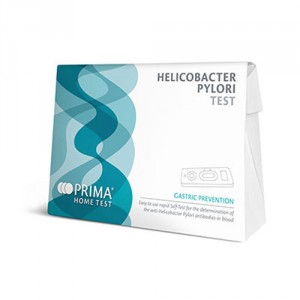Stomach Ulcers Are Commonplace and Usually as a Result of an H. Pylori Infection
A sore on the stomach’s or duodenum’s lining (the start of the small intestine) is a peptic ulcer. They could also be located in the oesophagus slightly above the stomach, but these cases are rare.
Gastric or stomach ulcers are peptic ulcers located in the stomach and those located in the duodenum are referred to as duodenal ulcers. An individual could have gastric and duodenal ulcers simultaneously and they could occur multiple times throughout a lifetime.
The Helicobacter pylori (H. pylori) bacterium causes most peptic ulcers. One of the most commonplace infections in the UK is H.pylori. These bacteria will infect a quarter of the population at some point in their life. If it isn’t treated properly, the infection could last a lifetime. Approximately 15% of those who get the H. pylori infection go on to get peptic ulcers. Even though it could strike at any age, it is mostly found in the over 60 years of age population.
Both duodenal and stomach ulcers have similar abdominal discomfort symptoms such as;
- a pain that is dull or burning
- usually takes place between meals or at night time
- could be temporarily eased by consuming food or by using antacids
- persists for durations of a few minutes to hours and shows up intermittently for many days or weeks
Additional possible symptoms might include:
- losing weight
- inadequate appetite
- bloated tummy and burping
- queasiness and throwing up
It is simple to treat the H. pylori infection if you have the above symptoms. Identify the problem with the Zoom Health Stomach Ulcer Test
A stomach ulcer, also known as a peptic ulcer, is a sore that develops on the lining of the stomach or the duodenum (the beginning of the small intestine). It is frequently brought on by an infection with the Helicobacter pylori (H. pylori) bacterium. Up to 25% of the population in the UK may experience H. pylori infection at some point in their lives. If the infection is not treated, it may last a lifetime and eventually cause peptic ulcers.
A dull or searing ache in the belly, usually felt between meals or at night, is one of the signs of stomach ulcers. Eating or taking antacids can briefly ease this ache. Over the course of several days or weeks, the pain may come and go and last anywhere from a few minutes to several hours. Weight loss, a lack of appetite, bloating, burping, nausea, and vomiting are additional potential symptoms.
It’s critical to consult a doctor and get tested for H. pylori infection if you experience symptoms. The presence of the bacteria can be detected and used to determine the best course of therapy with the Zoom Health Stomach Ulcer Test. The H. pylori infection is typically easy to treat, and it can help reduce the symptoms and stop the growth of peptic ulcers.
Diagnosis and Treatment
If you suspect you have a stomach ulcer, your doctor may recommend tests such as an upper endoscopy or a breath test to check for H. pylori infection. Treatment typically involves antibiotics to eliminate the bacteria and medications like proton pump inhibitors (PPIs) to reduce stomach acid production and promote healing.
Taking a Stomach Ulcer Test
Identify the Helicobacter pylori (the bacteria that causes stomach ulcers) antibodies with the Zoom Health Stomach Ulcer test.
Food and drink take it into the stomach, however, it is unaffected by the stomach acids.
Features
- An easy test with step by step directions.
- Limiting food or drink isn’t required before the test
- Carry out the test at home – no lab work required to get test results.
- Just a drop of blood is needed, with observable results in less than 10 minutes.
- Do the test at any time throughout the day.
- In-depth instruction brochure includes valuable information about stomach infection.
Do I really need to test for Helicobacter pylori?
- Over half of the world’s population is believed to have a Helicobacter pylori infection, so there is a 50 -50 chance you are infected.
- If the infection isn’t treated, you are at higher risks of getting heartburn, indigestion, gastritis (stomach lining inflammation), stomach ulcers and even cancer.
If I’m positive for Helicobacter pylori infection, what should I do next?
- See your doctor to get a more in-depth exam and diagnosis as well as proper treatment.
- Only make a medical decision after consulting with your doctor.
- Even if the test is negative for Helicobacter pylori, your stomach ulcer might be caused by something else.
My results were negative, but my digestive problems persist, what should I do?
Ask your pharmacists if there are any over the counter meds you can take.
Pack includes: Every pack comes with 1 test cassette, 1 buffer solution, 1 safety lancet along with user instructions.
Lifestyle Changes
In addition to medical treatment, lifestyle modifications can help manage symptoms and prevent recurrence of stomach ulcers. These include:
- Avoiding smoking and excessive alcohol consumption
- Managing stress through relaxation techniques
- Eating a balanced diet rich in fruits, vegetables, and whole grains
- Limiting spicy, fatty, or acidic foods that may irritate the stomach lining
Photo “Pain” by Anthony Cunningham for Zoom Health
Zoom Health is a leading UK supplier of Home Health Tests and Earplugs






